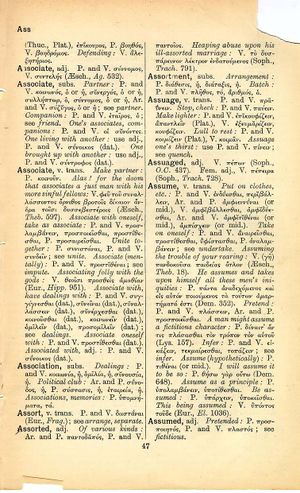assume
ἆρά γε λόγον ἔχει δυοῖν ἀρχαῖν, ὑλικῆς τε καὶ δραστικῆς → does it in fact have the function of two principles, the material and the active?
English > Greek (Woodhouse)
v. trans.
Put on clothes, etc.: P. and V. ἐνδύεσθαι, περιβάλλειν, Ar. and P. ἀμφιεννύναι (or mid.), V. ἀμφιβάλλεσθαι, ἀμφιδύεσθαι, Ar. and V. ἀμφιτιθέναι (or mid.), ἀμπίσχειν (or mid.).
Take on oneself: P. and V. ἀναιρεῖσθαι, προστίθεσθαι, ὑφίστασθαι, P. ἀναλαμβάνειν; see undertake.
Assuming the trouble of your rearing: V. (γῆ) πανδοκοῦσα παιδείας ὄτλον (Aesch., Theb. 18).
He assumes and takes upon himself all these men's iniquities: P. πάντα ἀναδεχόμενος καὶ εἰς αὑτόν ποιούμενος τὰ τούτων ἁμαρτήματά ἐστι (Dem. 352).
Pretend: P. and V. πλάσσειν, Ar. and P. προσποιεῖσθαι.
A man might assume a fictitious character: P. δύναιτʼ ἄν τις πλάσασθαι τὸν τρόπον τον αὑτοῦ (Lys. 157).
Infer: P. and V. εἰκάζειν, τεκμαίρεσθαι, τοπάζειν; see infer.
Assume (hypothetically): P. τιθέναι (or mid.).
I will assume it to be so: P. θήσω γὰρ οὕτω (Dem. 648).
Assume as a principle: P. ὑπολαμβάνειν, ὑποτίθεσθαι.
Be assumed: P. ὑπάρχειν, ὑποκεῖσθαι.
This being assumed: V. ὑπόντος τοῦδε (Eur., El. 1036).

